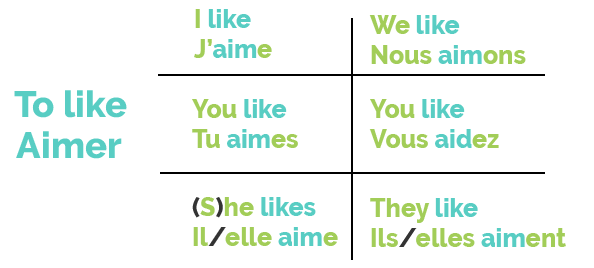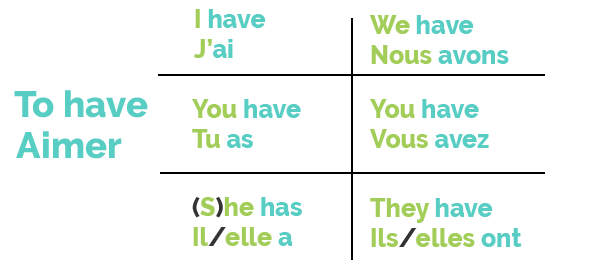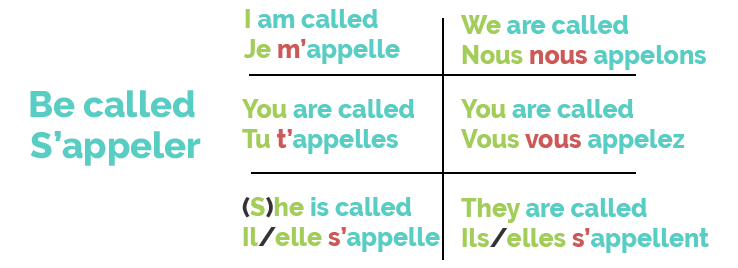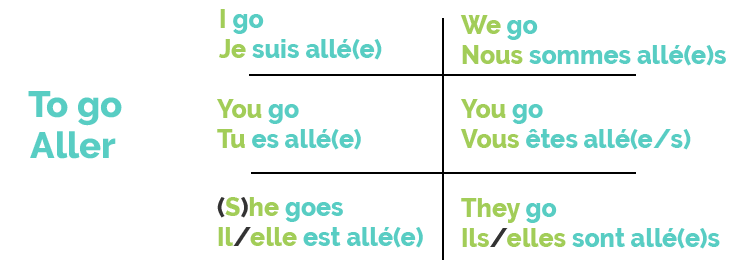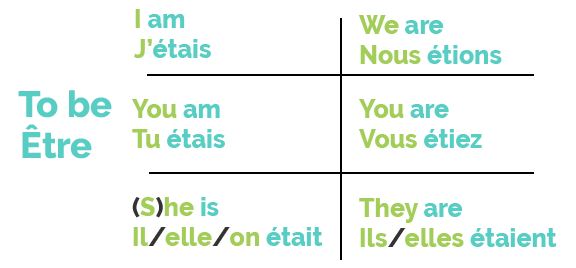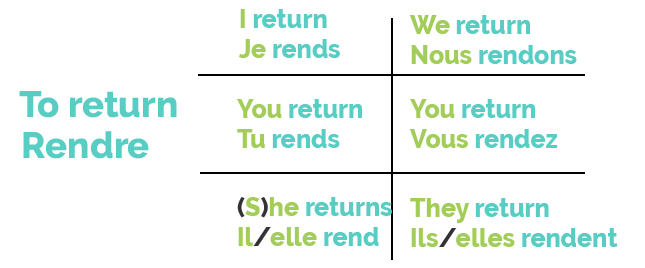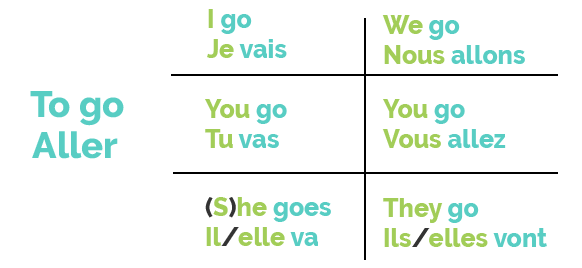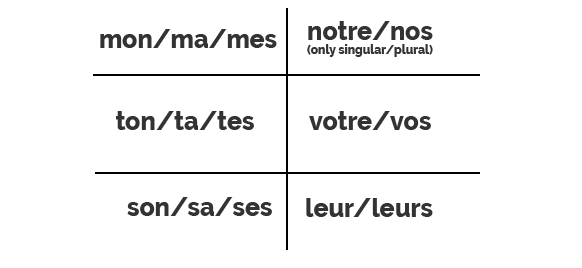French
Key:
Subject | Object | Verb | Adjective | Adverb1
At the StoreBienvenue is the most common way to say welcome. Used alone, as a greeting, it is always feminine (with an -e at the end). But, used as an adjective or noun, it can be ,asculin bienvenu, or feminine bienvenue. In French, adjectives change endings based on someone’s gender. -e = one female, -es = several females, when most of the words ending with a consonant are masculine. But, when French people speak, they generally don’t pronounce the last letter. So, in the case of bienvenu(e), there is no difference of pronunciation between the femine and the masculin forms.
French speakers use two different subjects for the informal (tu) and polite (vous) translation of you. The end of the verb also changes depending on the subject (tu peux m’aider ?, vous pouvez m’aider ?).
Moreover, for yes/no questions, you don’t need do as it is implied in the question mark and the inflection of the speaker’s voice. There are several ways to ask something simple in French, but this one (subject + verb + complement ?) might be the simplest.
Audio
This is the polite way to ask for someone’s help. First, Julie uses the subject vous to speak to the barista because she doesn’t know her. For a more information conversation, people use tu : “tu peux m’aider” or “aide–moi“, generally followed by “s’il te plaît”. Note that the verb is changing form depending on the subject. To ask someone politely, French also uses the condition “je voudrais” instead of the present “je veuz“.
French uses the verb aimer to say like or love. To emphasize it, like in I like it a lot/very much, they often use the verb adorer. Adorer and aimer are regular verbs from the fist groupe (that end with -er). The conjugation is very simple.
Audio
Like most European countries, in France, people use euros, but there are many French speaking countries. They don’t all share the same currency. Below are some example of countries and their currencies. A lot of them are named “franc“, the former currency of France.
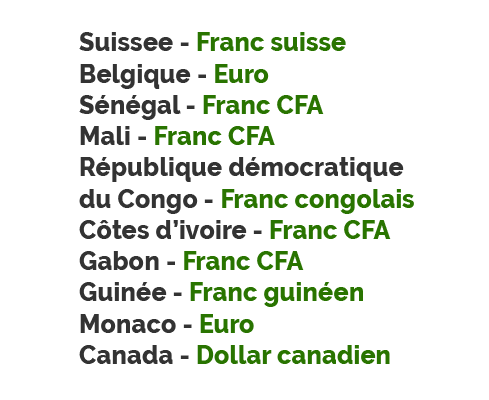
In French, the negation is composed of two words, here ne and pas, placed before and after the verb. Ne is always before the verb (when you write), while the second part changes. For example: rien = nothing and jamais = never. But, when people speak, they often skip the first part ne and pronounce only the second part (pas, rien, jamais, etc.).
Audio
You might have noticed that the word anglais is not in capitalized. That’s because French language makes the difference between the language and the adjectives – “Je parle français” (“I speak French“), “J’ai un livre français” (“I have a French book” – and the people/nationality – “Je suis Français“.
Audio
The subject Je, like a lot of other words (for example ne) is written and pronounced differently depending on the first letter of the following word. If it begins with a consonant, you say/writeje, but when it begins with a vowel, you say/write j’. For example, “Je parle“/”J’aime.
The verb Avoir is very useful, but also irregular. Try to memorize the conjugation. You will need it very often.
Audio
In French, the last letter of a word is often silent. So, petit is pronounced “peti” (we don’t hear the “t”), while the feminine petite is pronounced “petit” (we hear the “t”, but not the “e”).
Audio
Audio
Audio
2
IntroductionsS’appeler is a reflexive verb, which may cause some confusion for new French learners. The direct translation of “Je m’appelle Julie” is “I call myself Julie“. It might seem weird, but it’s a common way to introduce yourself and others. Let’s see how reflexive verbs are conjugated.
Audio
For an informal conversation, the most common way to ask someone “How are you?” is “Comment ça va?” (literally: “How it is?”), and the common answer is “ça va“. For a more formal exchange, French would generally use the question “Comment allez–vous?”, and the typical answer would be “Je vais bien, merci” or just “Très bien, merci. Et vous ?”
Audio
Here, the verb aller is used at one of the past tenses, named passé composé, because it is composed of two verbs: the modal (here, être conjugated at the present tense), and past participle of the verb aller. Note that when the modal is être, the participle has to respect the gender of the subject (-e for the feminine, -s for plural). The other modal used for this tense is avoir. Here is the conjugation of aller at the composed past:
Audio
The verb être is very irregular, so it is important to memorize it. Here is the conjugation:
In French, people don’t visit someone, they literally “return a visit to someone“, which is said “rendre visite à quelqu’un“. But, they visit things: “Je visite une maison” (“I visit a house“). Rendre is also a different kind of verb than the ones seen previously. Let’s see how it is conjugated in the present tense:
Audio
Here is another irregular verb that is very common and useful. Let’s see its conjugation:
Audio
Audio
Audio
“Il y a” is a fix verbal form that means there is/there are. It doesn’t change depending on gender or number, so it is a very easy way to communicate a lot of information. It is generally used to make decisions.
Audio
In French, the noun an(s) is mandatory when you give someone’s age. The informal question “Tu as quel âge ?”, and the formal way of asking is “Quel âge avez–vous ?”.
Audio
In French, the gender and number of a possessive depends on the gender/number of the object possessed. For example, when Thomas speaks about his sister, he says “ma soeur“, but for his brother, he would use “mon frère”, and for his brothers, “mes frères”.
Audio
Audio
Audio
3
At the RestaurantMost of the time, French uses the verbs manger and boire with the complement quelque chose (something). For example: “Tu veux boire quelque chose ?” or “Je mangerais bien quelque chose” (“I would like to eat something“). Audio
Audio
Audio
Here, the verbal form il y a is totally different than in the pervious examples. It also means ago, and it is placed before the time you want to mention.
In French, we is officially translated by nous, but in informal conversations, it is more common to use on. The conjugation of on is singluar and it’s the same for il/elle.
Audio
Audio
Audio
Contrary to the legend, people don’t use garçon” (at least not anymore) to call a waiter, but they say “Excusez–moi” to attract attention, or they just raise their hand.
Audio
Audio
Seems is often translated with this strange, but common, expression “avoir l’air“, which could be translated by “have an air“. It is widely used to give an impression you have on someone or something. For example: “Tu as l’air fatigué(e)“. (“You seem tired“), or “a l’air nuageux” (“The weather seems cloudy“).
Audio
Here is another past tense, named imparfati. It is generally used to make descriptions. Here is the conjugation of être at the imparfait:
Audio
Audio
Audio
Audio
Vocabulary List
- Qui Who
- Quoi / Que / Qu’est-ce que What
- Quand When
- Où Where
- Pourquoi Why
- Comment How
- Combien How much
- Je ne comprends pas I don’t understand
- Plus lentement, s’il vous plaît. More slowly, please.
- Je suis désolé(e) / Excusez-moi / Pardon Sorry
- Vous pouvez répéter s’il vous plaît ? Can you repeat that?
- Comment dit-on ____ en français ? How do you say ____ in Spanish?
- Je ne sais pas I don’t know
- Ça veut dire quoi ____ ? What does ____ mean?
- Vous pouvez m’aider ? Can you help me?
- Vous pouvez / tu peux You can
- Vraiment ? Really?
- Je veux I want
- Tu veux / Vous voulez You want
- J’ai besoin de I need
- Tu as You have
- Vous avez You have (polite)
- Nous avons We have
- Je dois I have to
- J’aime I like
- Je m’en vais (Je vais à) I go(ing to)
- Tu aimerais You would like (Would you like…?)
- Je suis allé(e) I went
- Je suis I am
- Tu es It is
- Manger Eat
- Boire Drink
- Je travaille I work
- Je vis / J’habite I live
- Je reste I stay
- Acheter Buy
- Je m’appelle My name is
- Tu as besoin de / Vous avez besoin de You need
- J’ai I have
- Tu aimes You like
- Je peux I can
- Nous pouvons We can
- Nous y allons / On y va (Nous allons à) We go(ing to)
- J’aimerais I would like
- Tu es You are
- Je suis I am (estar)
- Il/elle est It is (estar)
- Je parle I speak
- Tu parles / Vous parlez You speak
- Je mange I eat
- Je bois I drink
- Tu vis You live
- Je crois que I believe
- J’ai faim I’m hungry
- Pardon Excuse me
- S’il vous plaît Please
- Notre/Nos Our
- Donc Then
- Maintenant Now
- Plus tard Later
- Après After
- Depuis Since
- Ici Here
- Il y a There is/There are
- Trop Too much
- Seulement Only
- Beaucoup Very much (A lot)
- Ensemble Together
- Avec moi With me
- Fête Party
- Restaurant Restaurant
- Hôtel Hotel
- Nourriture Food
- Eau Water
- Ce soir / Cette nuit Tonight
- Bientôt Soon
- Merci Thank you
- Bonjour Hello
- Madame Madam
- SMonsieur Sir
- Au revoir Goodbye
- Aussi Also/Too
- Aide Help
- Je/J’ I
- Tu You
- Nous We
- Ils/Elles They
- Mon/Ma/Mes My
- Ton/Ta/Tes Your
- Là/Là-bas There
- Avant Before
- Mais But
- Argent Money
- Jusqu’à Until
- Ans/Années Years
- Il/Elle He/she
- Aujourd’hui Today
- Demain Tomorrow
- Hier Yesterday
- Prochain/Prochaine Next
- Dernier/Dernière Last
- Peut-être Maybe
- Très Very
- Même si Even though (although)
- Certain(e)s Some
- Gauche Left
- Droite Right
- Tout droit Straight
- Indiquer le chemin Give directions
- Près (de) Near
- Loin (de) Far
